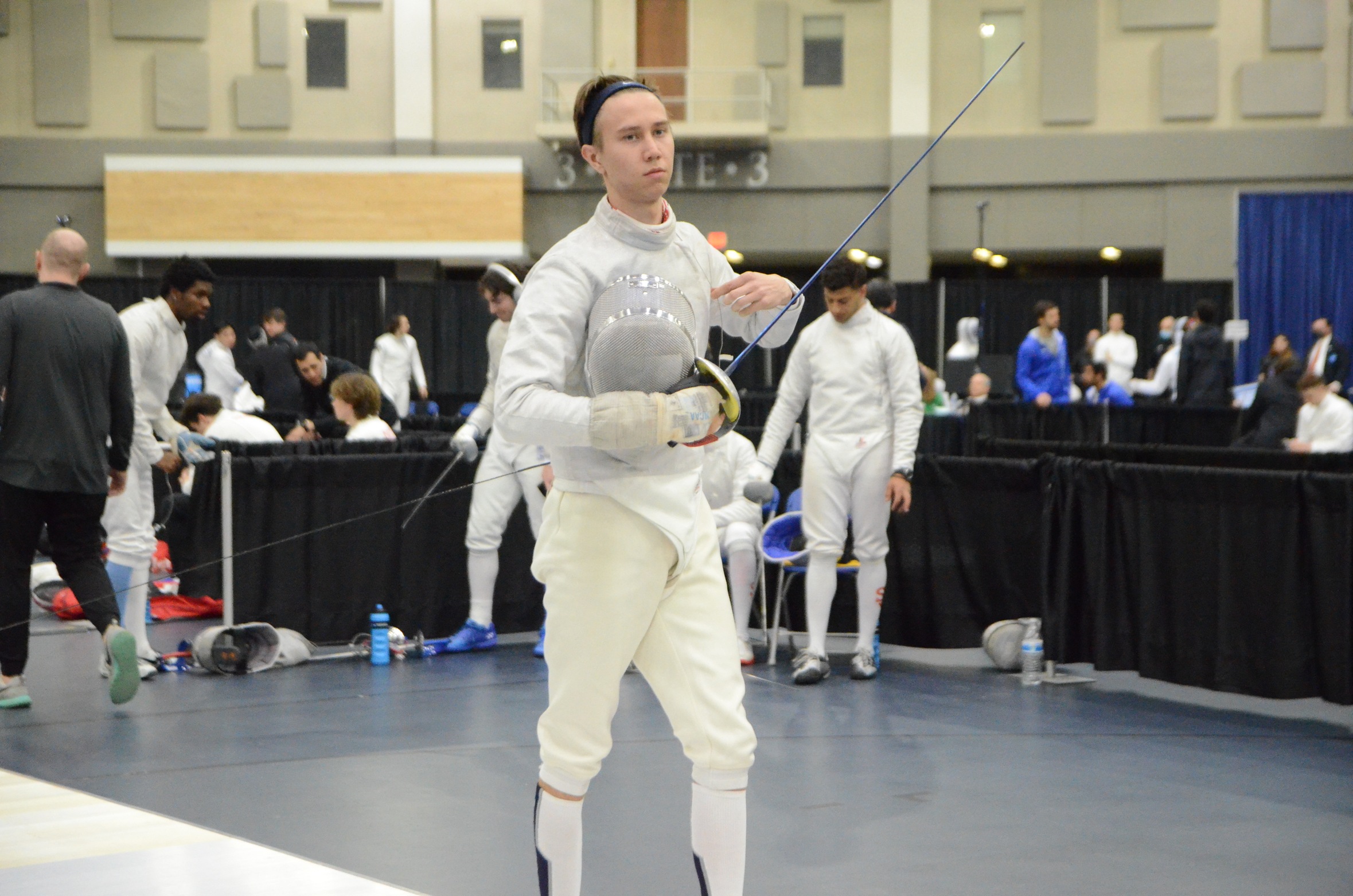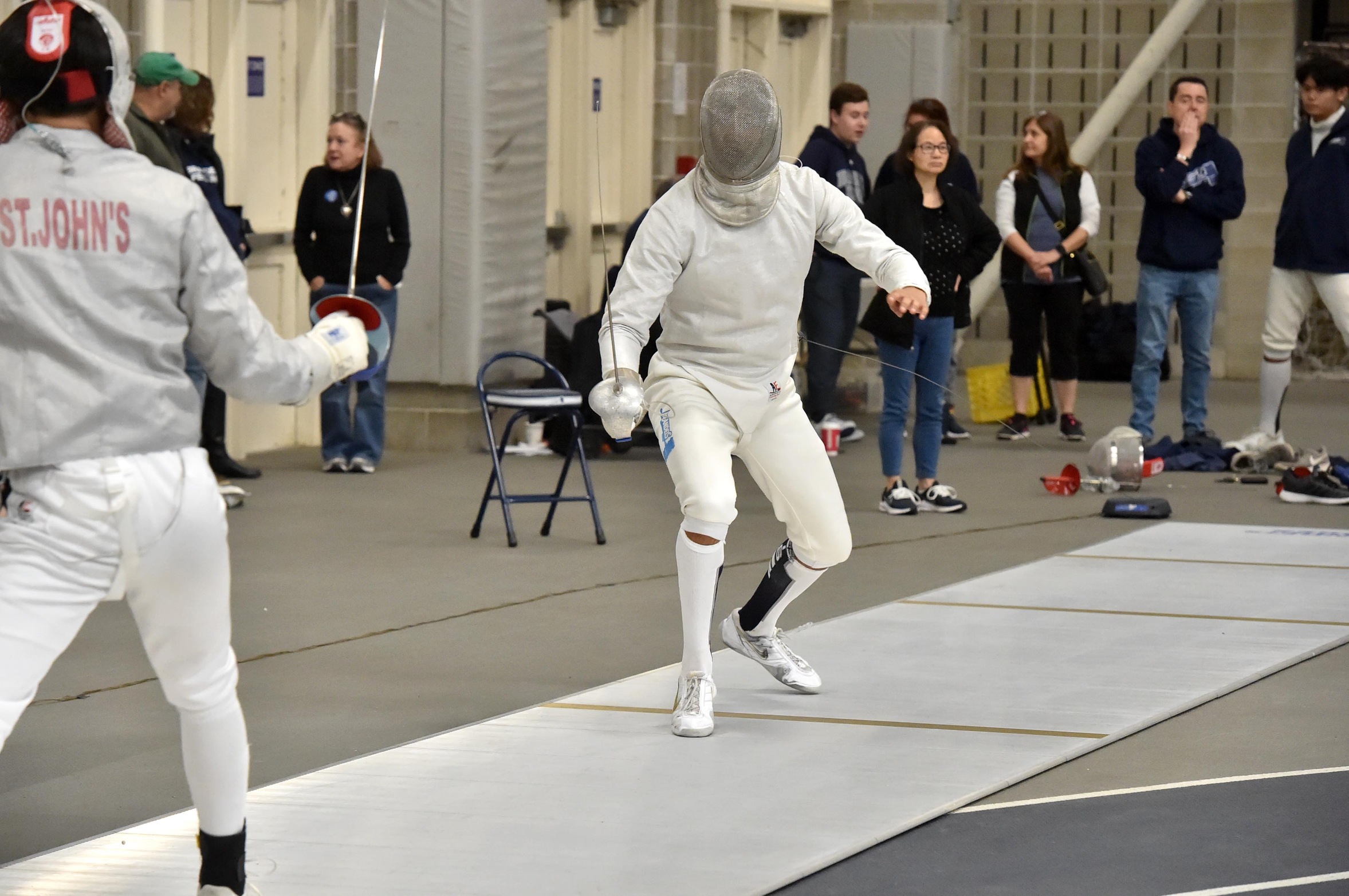
When the Brandeis University fencing team attends the 2023 NCAA National College Fencing Championships in Durham, North Carolina, next weekend, they will be sending more than just the largest contingent of Judges to nationals in a decade. They will also be sending a trio of sabre fencers that is one of the most experienced groups ever to represent the University, while also having most of their careers in front of them.
Senior Maggie Shealy, sophomore Tony Escueta and first-year Lev BenAvram qualified for the nationals with a combination of amazing regular seasons and impressive performances at the NCAA Regional meet at Harvard. For Shealy and Escueta, it will be a second-straight trip to the National Championships, where they will face off against some of the best fencers in the nation and, indeed, the world.
The trio were recruited to Brandeis by former head coach Jennie Salmon, who left Brandeis shortly before the season to take over the women's fencing program at her alma mater, Temple University. Their tutelage has continued under assistant coach Matthew Zich, who has been with Brandeis for five years, and Salmon's successor, Elif Sachs, who was an assistant under Hall of Fame coach Bill Shipman.
"I'm very proud to be part of the cadre that's going to NCAAs this year," Sachs said. "It's not just the fencers, it's also Matthew as their weapon coach. Matt has the right balance of high expectations for these kids with the exact right amount of stern guidance mixed with joy and a sense of humor to keep them light while they work to the best of their abilities. The fencers themselves are solid in their work ethic way beyond the scope of their sport."

Escueta also went to nationals in 2022 as a first-year. He put together six wins and placed 22nd overall, earning Division III Newcomer of the Year honors from the United States Fencing Coaches Association. "After seeing Maggie finish in the top eight last year, I am really inspired to try to do the same and earn All-America honors," Escueta said.
Nationals will be a new, though not entirely foreign, experience for BenAvram. The team format is one that's unique to college fencing, where individuals are winning bouts to score points for a team total – the Judges scored 20 points and finished in 17th place last year – while the international fencing he has experienced is mostly just based on individual results or team relay events, in which groups fencers face off directly. "It's an honor to compete at nationals," he said. "But I know that I am able to excel against this type of field, and I shouldn't expect anything less than the best for myself in this situation."
In joining the world of college fencing, BenAvram has also had to adjust to quicker bouts – a race to five touches, compared to a 15-touch bout in international competition. "I've felt that I was better at the 15-touch bouts," he explained. "I was always a better second-half-of-the-match fencer, and there really isn't one in college."

"Especially since we've all be fencing since we've been really young, none of these competitors are really new to us," Shealy added. "I've known them for years, I've worked camps with them. So it's not like I KNOW her, as in I've seen her around, but more like, 'Oh, I know her,' I've seen her for years. But we're all under the same rules. We are all working just as hard, if not harder than them."
The decision to put Brandeis on the backs of their uniforms came naturally to all three fencers. The quality of the education, a coaching staff that saw and believed in their abilities, and the diversity and culture established by the other fencers were key factors. Escueta hosted BenAvram on his overnights, and he in turn fondly recalled meeting Shealy on his first visit.
After meeting the team and getting to know the campus and its population, BenAvram knew that "Brandeis is the right school for me, regardless of fencing."
Escueta noted that the team is extremely diverse, in terms of their background, the amount of experience they have fencing, their interests outside of fencing, their fields of study, and much more. He sees it as a huge strength of the program. "There are all sorts of people on the team who you can turn to in terms of looking for advice," he mentioned. "No matter who you are, no matter what your personality is like, everyone has a role, a strength, that contributes to our success as a whole."
 Shealy and BenAvram have added an extra layer of difficulty into their lifestyles over the last year, competing in international competitions in addition to on the collegiate level. Shealy has spent time earning national-level points in far-flung locales like Athens and Brussels, where she finished in 44th place out of 183 competitors this March. BenAvram was selected by U.S. Fencing for the Junior National Team. He, along with fencers from Ohio State, Harvard and Columbia, will compete at Plovdiv, Bulgaria, next month.
Shealy and BenAvram have added an extra layer of difficulty into their lifestyles over the last year, competing in international competitions in addition to on the collegiate level. Shealy has spent time earning national-level points in far-flung locales like Athens and Brussels, where she finished in 44th place out of 183 competitors this March. BenAvram was selected by U.S. Fencing for the Junior National Team. He, along with fencers from Ohio State, Harvard and Columbia, will compete at Plovdiv, Bulgaria, next month.
For a senior like Shealy, her planning skills have been put to the test, but she's made it work. As a senior engaged in independent study work, the balance of fencing and academics has been something she's worked on for years. As a first-year, BenAvram has found it more difficult to fit training time around seminars and prerequisites. Professors have proven to be flexible and as accommodating as possible for each, but they've also found time to squeeze in work when possible.
Having seen what the other two have experienced internationally, Escueta doesn't currently have any designs on a higher level. "I still have the most fun with my college team at our college meets," he said.
-- by Adam Levin '94/MS '21, sports information director